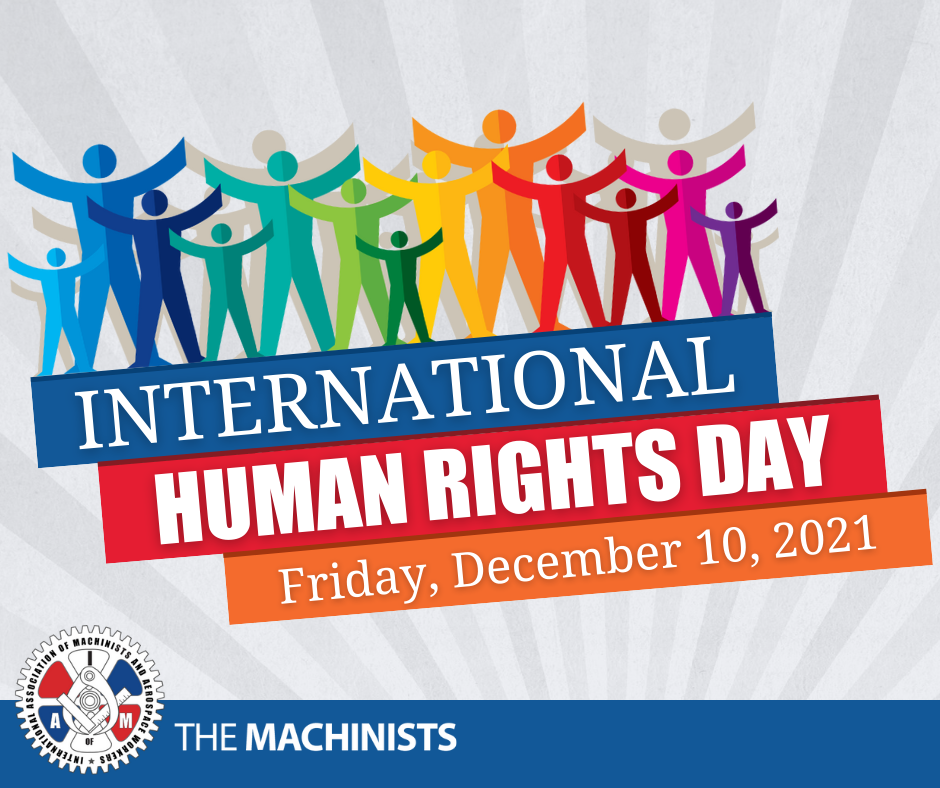

Every year on December 10th, we commemorate the Universal Declaration of Human Rights. Adopted in 1948 by the United Nations General Assembly, the Declaration reiterates that all people deserve a common standard of living, including liberty, freedom of opinion and expression, freedom from discrimination, the right to work, and the right to receive an education. This year, the focus is on reducing inequalities to advance human rights, because as noted in the Declaration, “All human beings are born free and equal in dignity and rights.”
Violence and harassment are real societal barriers to equality, both at home and in the workplace. Violence and harassment are defined as “range of unacceptable behaviors and practices, or threats thereof, whether a single occurrence or repeated, that aim at, result in, or are likely to result in physical, psychological, sexual or economic harm, and includes gender-based violence and harassment.” (ILO Convention C190). Violence and harassment prevent people from fully experiencing the dignity and freedom of being that is a core human right.
Violence and harassment can affect anyone—for example, one in every 4 women and one in 10 men will experience domestic violence in their lifetime, according to the Centers for Disease Control and Prevention. (CDC). But gender-based violence puts women and transgender people at the highest risk. The World Health Organization reports that, globally, 1 out of every 3 women will experience physical and/or sexual violence in their lifetime; most of that violence is from an intimate partner. (WHO). And with more legislation stripping the rights of transpeople being passed in the US than any other year, 2021 has seen at least 49 transgender or gender non-conforming people fatally shot or killed by other violent means. (PBS, HRC).
Anyone can be affected by violence and harassment at work, but the risk of violence and harassment can vary depending on the work sector, occupation, and/or working arrangements. This is why the IAM lobbied for legislation to pass the FAA Reauthorization Act of 2018 (H.R. 302). This legislation addressed long overdue safety priorities which included giving rights to airline employees who were being assaulted by passengers and protocols on how to deal with violent incidents.
Furthermore, the impacts of domestic violence and sexual assault in someone’s personal life often carry over into the workplace. Whether the victim exhibits increased absences or increased errors at work, or whether the abuser shows up at the workplace to instill more terror, domestic violence rarely stays at home.
As a Union family, we need to support our brothers and sisters. We all deserve the right to work in an environment free from violence or harassment, and together we can stand up for that right for those who most need our protection. We need to include language in our collective Bargaining Agreements (CBA) that protects us from harassment in the workplace. We also need to use our power and strength to push for legislation against gender-based, domestic, and other types of harassment and abuse—not only on a national level, but with our local and state governments as well.
If you are experiencing harassment or abuse, the IAM can help! The IAM EAP program is here for you, online and through the national helpline at 301-335-0735.
The National Domestic Violence Hotline is another valuable resource, on the web and at 1-800-799-SAFE (7233). LGBTQ+ resources are available at PFLAG’s website.
SOURCES:
United Nations (UN), “Human Rights Day,” https://www.un.org/en/observances/human-rights-day
International Labour Organization (ILO), “C190 – Violence and Harassment Convention, 2019 (No. 190),” https://www.ilo.org/dyn/normlex/en/f?p=NORMLEXPUB:12100:0::NO::P12100_ILO_CODE:C190
World Health Organization (WHO), “Violence against women,” March 9, 2021, www.who.int/news-room/fact-sheets/detail/violence-against-women
Centers for Disease Control and Prevention (CDC), “Preventing Intimate Partner Violence,” https://www.cdc.gov/violenceprevention/intimatepartnerviolence/fastfact.html
PBS, “2021 is now the deadliest year on record for transgender people,” November 18, 2021, https://www.pbs.org/newshour/nation/2021-is-now-the-deadliest-year-on-record-for-transgender-people
Human Rights Campaign, “Fatal Violence Against the Transgender and Gender Non-Conforming Community in 2021,” https://www.hrc.org/resources/fatal-violence-against-the-transgender-and-gender-non-conforming-community-in-2021